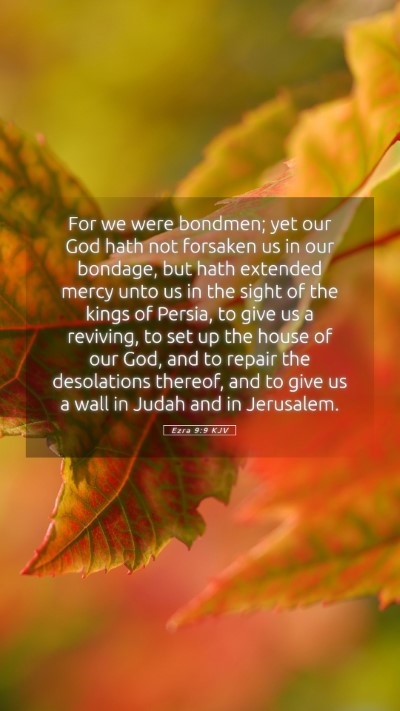Old Testament
Genesis Exodus Leviticus Numbers Deuteronomy Joshua Judges Ruth 1 Samuel 2 Samuel 1 Kings 2 Kings 1 Chronicles 2 Chronicles Ezra Nehemiah Esther Job Psalms Proverbs Ecclesiastes Song of Solomon Isaiah Jeremiah Lamentations Ezekiel Daniel Hosea Joel Amos Obadiah Jonah Micah Nahum Habakkuk Zephaniah Haggai Zechariah MalachiEzra 9:9 Meaning
What is the meaning of Ezra 9:9?
For we were bondmen; yet our God hath not forsaken us in our bondage, but hath extended mercy unto us in the sight of the kings of Persia, to give us a reviving, to set up the house of our God, and to repair the desolations thereof, and to give us a wall in Judah and in Jerusalem.
Ezra 9:9 Bible Verse Meaning
Understanding Ezra 9:9: A Deep Dive into its Meaning
Ezra 9:9 is a profound verse within the context of the Old Testament that speaks to the themes of mercy, hope, and divine intervention. The insights derived from this passage can be enhanced through a careful examination of public domain commentaries, including those by Matthew Henry, Albert Barnes, and Adam Clarke.
Verse Context
The full verse states: "For we were bondmen; yet our God hath not forsaken us in our bondage, but hath extended mercy unto us in the sight of the kings of Persia, to give us a reviving, to set up the house of our God, and to repair the desolations thereof, and to give us a wall in Judah and in Jerusalem." Understanding this passage requires us to consider the historical context of Ezra's mission and the plight of the Israelites after the Babylonian exile.
Commentary Insights
-
Matthew Henry's Commentary:
Henry emphasizes God's unyielding faithfulness, even when Israel was in captivity. The mention of "not forsaking" indicates that God's mercy is present even in dire circumstances. His grace is extended not due to Israel's merit, but purely out of divine compassion. Henry elaborates on the notion of "reviving," highlighting that restoration involves both physical and spiritual renewal.
-
Albert Barnes' Commentary:
Barnes notes the significance of the mercy shown to Israel. He interprets "bondmen" to indicate their past struggles and the profound transformation that can occur when God intervenes. The "kings of Persia" reference indicates the shift of power as part of God’s plan, demonstrating how divine influence extends even into the hearts of secular rulers.
-
Adam Clarke's Commentary:
Clarke gives attention to the phrases of revival and restoration. He articulates that the restoration of hope and the establishment of worship signify a crucial turning point for the Israelite community. Clarke stresses the importance of the "wall in Judah and Jerusalem," interpreting it as a metaphor for security and protection within God's covenant.
Theological Implications
This verse encapsulates several crucial theological themes that strike at the heart of biblical faith:
- God's Faithfulness: Despite Israel's failures, God remains faithful to His promises.
- Divine Mercy: Illustrates that mercy comes from God, which is pivotal for believers seeking understanding of their own relationship with God.
- Restoration: The idea that God can revive and restore is central to the Christian faith, illustrating the potential for renewal at all levels.
- Interconnectedness of History and Faith: The mention of Persian kings exemplifies how historical events are woven into the narrative of divine providence.
Applications of the Verse
Here are some practical applications of Ezra 9:9 for contemporary believers:
- During times of personal struggle, remember God's promise of mercy and restoration.
- Recognize that God can work through unexpected avenues to bring about His plans.
- Consider the importance of communal worship and community rebuilding in reflecting God’s faithfulness.
- Reflect on personal actions and attitudes that may contribute to spiritual captivity, seeking revival through repentance and faith.
Bible Cross References
To further understand Ezra 9:9, consider these related verses:
- Nehemiah 1:8-9: A call for restoration and remembrance of God's covenant.
- Psalm 126:1-3: The joy of restoration after a season of sorrow.
- Isaiah 54:7-10: The promise of God's everlasting kindness and mercy towards His people.
Conclusion
Ezra 9:9 serves as a powerful reminder of God's love and commitment to His people. The intertwining themes of grace, hope, and restoration provide fertile grounds for an enriching Bible study. Whether engaging in online Bible study groups, utilizing Bible study tools, or exploring personal Bible study lessons, this verse offers profound insights into the character of God and the redemptive power manifest through His mercy.
Further Study Suggestions
For those interested in deepening their understanding of this verse, consider the following:
- Participate in Bible study courses focused on Old Testament narratives.
- Explore historical context in Bible study resources that detail Persian history and its impact on Israel.
- Engage with online Bible study platforms to connect with others seeking to explore similar topics.


